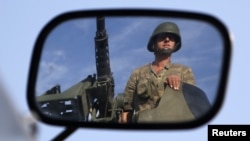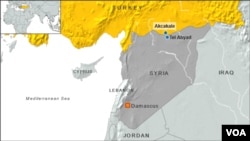CAIRO —
The military exchange between Turkey and forces in Syria threatens to inflame the region, highlighting differences between Arab and non-Arab nations, as well as splits between Sunni- and Shi'ite-led governments, analysts say.
Turkey is at the forefront of nations directly confronting the Syrian government, potentially drawing its NATO allies into a conflict many in the region had hoped to solve locally.
Several regional analysts are confident Ankara will not pursue that route, despite the Wednesday's incident in which Syrian shells killed five civilians in a Turkish border town.
“Turkey will not declare war," said Nadim Shehadi, a researcher at London-based Chatham House. "Turkey would need international support and Arab support to move forward.” But Arab support is questionable.
Though the Arab League suspended Syria last year, and Egypt's president is leading a regional effort to end the conflict, no Arab state is heeding Qatar's call for direct Arab military intervention.
As for Turkey's Western partners, Shehadi believes Ankara is working on a longer-term plan. “They are keeping the crisis going on a low fire and putting on the table the option of NATO needing to get involved, which will not happen, of course, now," he said. "But it is a way of helping the Turkish government in its foreign policy.”
For much of the past decade, Ankara has been trying to raise its regional profile, cultivating ties with, among others, the Syrian government and making inroads into the political and economic spheres of its neighbors. As the Arab Spring unfolded last year, Turkey kept up its push, being the first, for example, to establish an embassy in post-Ghadhafi Libya.
It has long backed the uprising in Syria, has housed tens of thousands of the war's refugees and given a platform for the Syrian political opposition. The Turkish border has become a gateway for outside support of the rebel cause, cementing Turkey's role as a regional, if non-Arab leader.
Such help has infuriated some in Damascus, like Bassam Abu Abdullah who runs a private political-research group in the Syrian capital. “They tried to send more rebels," he said. "They tried to send more weapons. And we have here many nationalities [among the rebels].”
Abu Abdullah's view of the conflict, one shared by the Syrian government, is one in which Turkey is part of a wider conspiracy to isolate Syria - and its ally Iran. “They are [having] what we would call a proxy war," Abu Abdullah said. "Who are participating? Who are controlling all this?”
The political analyst sees it as a fundamental split between Shi'ite-led Syria and Iran, and the Sunni leadership in Turkey and the Gulf. Abu Abdullah said the United States and Europe are using the conflict, in part, to break their nemesis Iran and the “Shi'ite crescent” that runs through the region.
Chatham House analyst Shehadi disagrees, and sees the current tensions as rising from internal Turkish politics - the opposition chiding the government for having acted too much on its own on Syria. “That is Turkey's dilemma, because the opposition is accusing the Turkish government of conducting this adventure without real support from its NATO allies,” he said.
NATO has resisted the idea of intervening, as it did last year in Libya, and whether Turkey will ask the Western alliance to change its position is unclear.
Turkey is at the forefront of nations directly confronting the Syrian government, potentially drawing its NATO allies into a conflict many in the region had hoped to solve locally.
Several regional analysts are confident Ankara will not pursue that route, despite the Wednesday's incident in which Syrian shells killed five civilians in a Turkish border town.
“Turkey will not declare war," said Nadim Shehadi, a researcher at London-based Chatham House. "Turkey would need international support and Arab support to move forward.” But Arab support is questionable.
Though the Arab League suspended Syria last year, and Egypt's president is leading a regional effort to end the conflict, no Arab state is heeding Qatar's call for direct Arab military intervention.
As for Turkey's Western partners, Shehadi believes Ankara is working on a longer-term plan. “They are keeping the crisis going on a low fire and putting on the table the option of NATO needing to get involved, which will not happen, of course, now," he said. "But it is a way of helping the Turkish government in its foreign policy.”
For much of the past decade, Ankara has been trying to raise its regional profile, cultivating ties with, among others, the Syrian government and making inroads into the political and economic spheres of its neighbors. As the Arab Spring unfolded last year, Turkey kept up its push, being the first, for example, to establish an embassy in post-Ghadhafi Libya.
It has long backed the uprising in Syria, has housed tens of thousands of the war's refugees and given a platform for the Syrian political opposition. The Turkish border has become a gateway for outside support of the rebel cause, cementing Turkey's role as a regional, if non-Arab leader.
Such help has infuriated some in Damascus, like Bassam Abu Abdullah who runs a private political-research group in the Syrian capital. “They tried to send more rebels," he said. "They tried to send more weapons. And we have here many nationalities [among the rebels].”
Abu Abdullah's view of the conflict, one shared by the Syrian government, is one in which Turkey is part of a wider conspiracy to isolate Syria - and its ally Iran. “They are [having] what we would call a proxy war," Abu Abdullah said. "Who are participating? Who are controlling all this?”
The political analyst sees it as a fundamental split between Shi'ite-led Syria and Iran, and the Sunni leadership in Turkey and the Gulf. Abu Abdullah said the United States and Europe are using the conflict, in part, to break their nemesis Iran and the “Shi'ite crescent” that runs through the region.
Chatham House analyst Shehadi disagrees, and sees the current tensions as rising from internal Turkish politics - the opposition chiding the government for having acted too much on its own on Syria. “That is Turkey's dilemma, because the opposition is accusing the Turkish government of conducting this adventure without real support from its NATO allies,” he said.
NATO has resisted the idea of intervening, as it did last year in Libya, and whether Turkey will ask the Western alliance to change its position is unclear.











